Entries tagged as kazakhstan
Related tags
almaty alps asia asia2013 berlin border bus china coach erlian khorgas koktobe moscow mountains petropavl shymbulak snow train transsiberian travel warsaw yining architecture astana baiterek khanshatyry amusementpark aviation azerbaijan baikal beijing belarus capsulehotel caspian ccp censorship childrensday chinghai cinderella climatechange copyright dam disney disneyland dunhuang ecology erenhot fake ferry flying freesoftware greatfirewall guangzhou haikou hainan hohhot hongkong hostel hotel irkutsk journey kualalumpur language laos lenin listwjanka malaysia metro miradormansion mongolia poland portbaikal publictransport pyramid qwerty rain rainforest russia sanya seat61 shijingshan stepmania suprememaster terracottawarriors thailand tiananmen ticket tram transport transsib travelling trip2011 typhoon ulaanbaatar ulan-ude ulanude urumqi vegan vegetarian visa waterpower weather windenergy xian xinjiang yanoda yekaterinburg zamyn-uud zensur arcade boluo boten casino coffee computerhistory copycat ghosttown hallstatt huizhou luoyang magistral migrationcard migrationpolice museum northwestchina retro retrogames tankodrom 129a 1mai 23c3 24c3 27c3 a100 abgeordnetenhaus akongress akw allianz anarchiekongress antiatom atheismus atomkraft autobahn bahnhof belene bild brandenburg bundestagunited buskampagne bz ccc cellular compiz creativecommons dataretention datenschutz demonstration dose elephantsdream energie energietisch energiewende freeculture freedomnotfear freifunk freiheitstattangst frequencies frequency fsfe gott gsm informationsfreiheit itu jugendumweltbewegung jukss kamera kameraüberwachung kernkraft klima klimaschutz klimawandel kohle kohlekraft kongress königswusterhausen kyoto lessig linux mcplanet mobilephones moleculeman musik ökologie ökostrom openbsc openbts openstreetmap osm osmocombb papst peterschaar piratenpartei polizeigewalt preise privacy privatsphäre ratzinger re-publica re-publica09 religion rp09 rwe science security sony springer strom stromnetz tagebaue taz theory thermen topberlin treptow tuberlin überwachung ubuntu umwelt umweltschutz unserwasser urgewald verkehr videoüberwachung volksbegehren vorratsdatenspeicherung wahl wasser wg wiki windowsxp wiretapping wirklimaretter wos wos4 youtube zimmer babelfish chinese english freizeitpark googletranslate journalismus mandarin presse pressefreiheit russian tagesschau translation universaltranslator cement climate decarbonization industry steel altparty antinuclear cablemodem d-link demoscene efficiency eletricity environment finland helsinki kabeldeutschland loviisa o2 router stromverbrauch crookedforest forest gryfino nature placesFriday, December 13. 2013
Fastest overland route from Europe to China
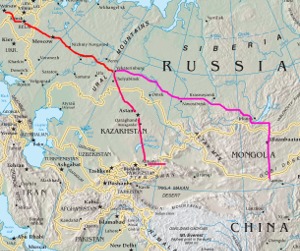 The well-known way of getting from Europe to China overland is the transsiberian railway. However, I noted that the route through Kazakhstan I took is the quickest way to get to China by train and bus. I thought I'd write that up:
The well-known way of getting from Europe to China overland is the transsiberian railway. However, I noted that the route through Kazakhstan I took is the quickest way to get to China by train and bus. I thought I'd write that up:- Take train EC 43 from Berlin Hauptbahnhof (09:37 on Monday, Berlin time) to Warsaw Wschodnia, change to train D 10SZ (15:28). If you - like me - feel that the time to switch trains is a bit risky in case of delaqys, you can take the earlier Beriln-Warsaw-train EC 41 (06:37 until 12:08). There's also a direct Berlin-Moscow-train D 50472 (Berlin 04:28, Moskwa Belorusskaja 10:33), but it's often sold out early.
- Spend some time in Moscow and then take the Metro Line 5 (Circular Line) to Komsol'skaya (Metro of Kazasky railway station)
- Take train 090У from Moscow Kazansky (18:48 on Tuesday, Moscow time) to Petropavl/Petropavlovsk in Kazakhstan (09:46 on Thursday, Astana/Almaty time). Note that this only works every second Tuesday - you may choose other days where this train goes, but then other options may not work.
- Take train 152T from Petropavl (13:48 on Thursday, Astana/Almaty time) to Almaty (22:28 on Friday, Astana/Almaty time).
- Take bus number 100 to Sayran bus station and hope that they'll sell you a ticket late in the evening for the bus next morning. Find a place to sleep (but not very long).
- Take bus from Astana Sayran bus station (07:00 on Friday, Astana/Almaty time) to Yining (approx. 21:00 on Friday, Beijing time). You're in China.
With the transsiberian, you can leave Berlin on Monday (same options as above until Moscow) and take the D4ZJ direct train from Moscow to Beijing. You will enter China in Erlian on the next Monday at 00:47. So this makes almost 7 days vs. about 4 and a half days.
I wouldn't recommend anyone doing that. Better spend some time on the way and see some places in Russia or Kazakhstan. Also it should be noted that one obvious reason for being faster is that you'll enter China at a place much further in the west. And getting to the main part of china (the western part is much less inhabited than the eastern part and all big cities are in the east) can be somewhat troublesome. Still, I thought it might be of interest to document the fastest overland way from Europe to China.
I always assumed the starting point Berlin, obviously because I live there, adapting that to other starting places should be trivial. For example you can usually easily (and for a comparatively cheap price) reach Berlin by Eurolines bus in a day from other major european cities like Paris or London.
Tuesday, November 26. 2013
By Bus from Almaty/Kazakhstan to Yining/China
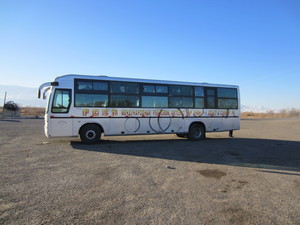
Our bus
I read at some places about a different possibility: A bus service from Almaty to Yining (伊宁 which, to make things complicated, has also a kazakh/uighur name - Kulja / Құлжа / قۇلجا - which, to make things even more complicated, can be written in many different ways using latin characters, cyrillic characters or arabic characters). The information was quite scarce. I basically only had a few forum entries mentioning it, so all the information I had seemed quite unreliable. And even the guy from the hostel where I stayed didn't know more.
I could find out that there's an international bus station in Almaty called Sayran (сайран). It is located somewhat outside the city and can be reached with bus number 100 from the Almaty 2 train station. I went there on Thursday and - although without language communication possible - could tell them what I wanted. They wrote me down a date and time for the next bus: Saturday at seven in the morning. Sadly, I didn't find out how often this bus goes. Saturday was fine for me so I bought my ticket for the bus.
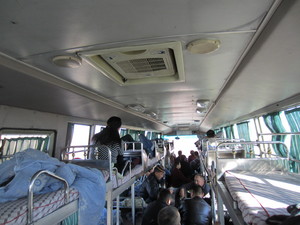
Beds and most people sitting on the floor
We spend about an hour at a restaurant in the middle of the desert and also some time at the border. I was a bit worried about the border crossing, because recently there have been some conflicts in the Xinjiang province, which is the chinese province you enter when coming from Kazakhstan. But at the border everything was fine, except that my border crossing took a bit longer than the others.
Right behind the border a lot of people were trying to offer money exchange. I didn't do that, because at such points you usually don't get the best exchange rates, which later turned out to be a mistake. It seems not exactly easy to change Tenge into Renminbi in Yining and as I'm writing this, I still have some Kazakh money with me after having tried to exchange it in three different banks in Yining.
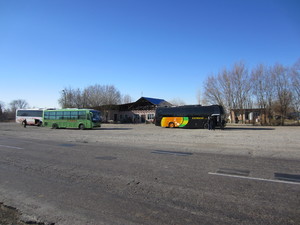
Lunch break in the desert - this really felt like being in the middle of nowhere
Hopefully this information will provide other travellers some help when they try to take this bus. To recap the important information:
- Bus from Almaty to Yining starts at Sayran bus station (reachable via local bus 100 from Almaty 2 train station).
- Runs at 07:00 a.m. on unknown weekdays, but due to my experiences probably on fridays and not on thursdays (If you have any info on that, e. g. a link to the bus company, please add it in the comments).
- Costs 4600 Tenge (thats about 21 € or 30 US$).
- Takes about 12 hours.
- Crosses border to China at Khorgas (霍尔果斯 in mandarin chinese, قورعاس in uighur, Хоргос in russian and Қорғас in kazakh language).
Pictures from bus trip
Saturday, November 23. 2013
Almaty and the little Alps
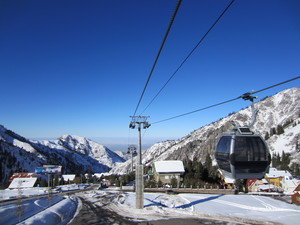 After Astana I went on to Almaty, which is the former capital of Kazakhstan. As I already wrote my previous two stops (Petropavl and Astana) were sharp contrasts, Almaty again was a completely different place. While also relatively expensive, it doesn't have the kind of "artificial" feeling that is present in Astana.
After Astana I went on to Almaty, which is the former capital of Kazakhstan. As I already wrote my previous two stops (Petropavl and Astana) were sharp contrasts, Almaty again was a completely different place. While also relatively expensive, it doesn't have the kind of "artificial" feeling that is present in Astana.I spend two days here. Almaty has some mountains surrounding it. There are two hilltops that one can reach via cable car. One is Koktobe, which has something like a small amusement park on the top. But due to lots of snow, most things there were closed. For the free software fans upon my readers: I saw an arcade machine with Tuxracer there. Never seen Tuxracer in an arcade machien before (however, I have seen an arcade machine with the free software game Stepmania on my last trip).
The other cable car starts near the ice skating stadium Medeo (which can be reached via public bus line 6) and goes to the ski ressort Shymbulak. The ski resort was closed and sadly, this meant that also the second cable car, which could bring one even more up the hills, was also closed. Still I had some stunning views on the mountains. In the gondola, I talked to a local who spoke a bit of English. He said they call it the "little Alps". I found that quite described it well. It really looked like you were in Austria or Switzerland. To make this impression complete, the cable car was even built in Switzerland.
Pictures from Almaty
Friday, November 22. 2013
Astana - the Dubai of Kazakhstan
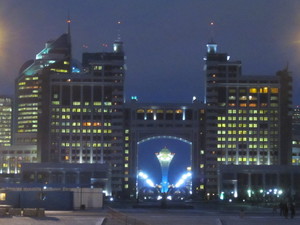
Baiterek from the West ...
I am glad that I've been both in an I assume average Kazakh city like Petropavl and the capital Astana. The contrast was pretty extreme. It wasn't like going to another city in the same country, it felt more like going to another world. Petropavl looked more or less like many post-soviet cities I've been before. Often a bit shabby, with waste laying around, broken or non-existent sidewalks and alike.
Astana is quite the opposite. Nothing here is old, large parts of Astana were build within the last two decades. Dirt or waste in the streets was almost zero and the traffic seems pretty civilized. Until 1997, Almaty was the capital of Kazakhstan, due to some complicated political compromises, it was moved to Astana and there began the growth of this boom town.
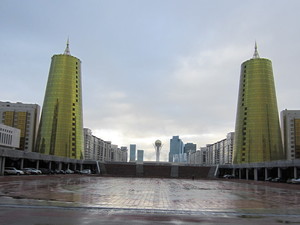
... and from the East
One thing that's notably missing in Astana: It has only a very limited public transport system. There's no metro, no tram and no trolleybusses. Normal busses are the only way to get around. In the evening, they are so crowded that it can be a pain to use them. Also, it's a bit tricky to find out which busses you want to take. Bus stations have sometimes maps with bus lines, but they don't show all bus lines, only the ones starting at exactly that bus stop. I didn't see any complete bus map anywhere offilne or online. I've pictured a bus map (and another one) which features some of the more important lines linking the city center with the train station, maybe this is of some help for other travellers.
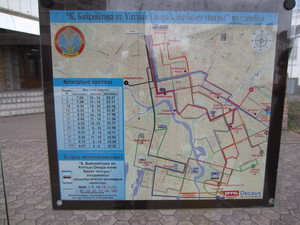
Astana Bus map
I originally planned to stay until saturday and take the train to China from Astana, but I found that the options of exploring the city were quite limited. You pretty quickly get around having seen all of its sights and there doesn't seem much around worth visiting. So I went on to Almaty.
A quick overview of things one can do and i did in Astana:
- Go on Baiterek tower: Not too expensive and nice view on the city with signs of distances to other relevant cities (e. g. Beijing 3656 km, Moscow 2280 km, Helsinki 3020 km).
- Ocenarium in the Duman entertainment center: Not that cheap, but nice and quite relaxing atmosphere. Biggest attraction are two large tunnels under a big aquarium, so you can watch the fishes from below.
- Pyramid (Palace of Peace and Reconciliation): Pyramid formed building containing an opera, conference centers and more. Not really worth visiting, it was mostly boring. I was the only english speaking person at that time, which didn't stop them from giving me a guided tour through the building.
- Khan Shatyry: Mostly a shopping center (so not thatwah interesting, except for the fact that it's a tent-like architecture). The upper floor contains a mix of an amusement park and an arcade hall. I saw a lot of those entertainment complexes, most other shopping centers in Astana have something alike. Also, there's a "Beach Club", which is a very expensive swimming bath.
- Watch unusual architecture: All over the city center.
Pictures from Astana
Posted by Hanno Böck
in English, Life
at
13:36
| Comments (0)
| Trackbacks (0)
Defined tags for this entry: architecture, asia2013, astana, baiterek, kazakhstan, khanshatyry, petropavl, travel
Thursday, November 21. 2013
Visa Registration in Kazakhstan
When I crossed the border to Kazakhstan I was told that I had to register my visa within 5 days. I read about that before, but I thought I had read somewhere that this wasn't necessary for EU citizens, so I was a bit surprised. But it turned out registration wasn't that difficult.
I did the registration on Monday in Astana. Registration needs to be done at the Migration Police office, which is located in the улица Сакена Сейфулина 29. I was there at 11:00 and the place was quite crowded and busy, so I already feared this might take some time. But it only took a couple of minutes, I gave them my passport, my migration card and a business card of my hotel (they wanted to know the adress). Then I was told to come back at 15:00. I was also told that they could only do a registration for a maximum of ten days. This wasn't a problem for me, because I don't intend to stay longer in Kazakhstan and my Visa validity ends there anyway. But for travellers wanting to stay longer in Kazakhstan this might be a cause of trouble.
After all, it wasn't that troublesome, but you should be aware of the registration when travelling to Kazakhstan. I don't know what to do if you're not passing a big city and thus have no way to visit the office of the migration police.
I did the registration on Monday in Astana. Registration needs to be done at the Migration Police office, which is located in the улица Сакена Сейфулина 29. I was there at 11:00 and the place was quite crowded and busy, so I already feared this might take some time. But it only took a couple of minutes, I gave them my passport, my migration card and a business card of my hotel (they wanted to know the adress). Then I was told to come back at 15:00. I was also told that they could only do a registration for a maximum of ten days. This wasn't a problem for me, because I don't intend to stay longer in Kazakhstan and my Visa validity ends there anyway. But for travellers wanting to stay longer in Kazakhstan this might be a cause of trouble.
After all, it wasn't that troublesome, but you should be aware of the registration when travelling to Kazakhstan. I don't know what to do if you're not passing a big city and thus have no way to visit the office of the migration police.
Sunday, November 17. 2013
Petropavl in northern Kazakhstan
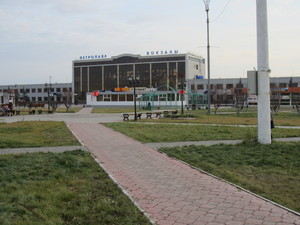 After a two-night train trip I arrived in Kazakhstan in the town Petropavl / Петропавл, also known under the name Petropavlovsk (which should not be confused with Petropavlovsk in Russia, where a town with the same name exists). There was no particular reason why I went there except that there's a relatively fast train from Moscow. Going directly from Moscow to Kazakhstan's capital Astana or the ex-capital Almaty would've meant a trip with at least three nights in a train, which I thought would be too much.
After a two-night train trip I arrived in Kazakhstan in the town Petropavl / Петропавл, also known under the name Petropavlovsk (which should not be confused with Petropavlovsk in Russia, where a town with the same name exists). There was no particular reason why I went there except that there's a relatively fast train from Moscow. Going directly from Moscow to Kazakhstan's capital Astana or the ex-capital Almaty would've meant a trip with at least three nights in a train, which I thought would be too much.There's surprisingly little information you find online about Petropavl in English, although it's not that small (about 200.000 inhabitants). I can't add that much, as I only stayed for one night.
I had a booking for a hotel, which teached me a little lesson: Sometimes preparing to much may cause more hassle than it helps. I didn't find the hotel I've booked at the address where it was supposed to be. You may wonder how I fail to find a hotel, but you need to know that "hotel" here not necessarily means the same as you are used to be (big building with big sign "Hotel XY"). They're often hidden in flats inside normal buildings.
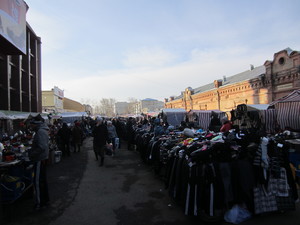 After checking the booking again I found out that it listed two addresses. One for the apartment and one as the contact address - and they were not nearby. No hint where I was supposed to go. While searching for my hotel, I found three other hotels which, by the way, were all much cheaper than everything that was bookable online. So finally I decided to forget my booking and just took one that seemed okay. Luckily, I could cancel my other booking without costs (I would've complained if I hadn't been able to do so) and ended up in a fine apartment, cheaper than planned and with a kitchen.
After checking the booking again I found out that it listed two addresses. One for the apartment and one as the contact address - and they were not nearby. No hint where I was supposed to go. While searching for my hotel, I found three other hotels which, by the way, were all much cheaper than everything that was bookable online. So finally I decided to forget my booking and just took one that seemed okay. Luckily, I could cancel my other booking without costs (I would've complained if I hadn't been able to do so) and ended up in a fine apartment, cheaper than planned and with a kitchen.Notable in Petropavl was a huge outdoor market. Although it's quite cold, it was crowded and seemed to be the normal way of shopping here. Not only food was sold, but anything from clothes to tools or car parts.
After spending a night, I took the train to the capital Astana.
Pictures Train Moscow-Petropavl
Pictures from Petropavl
Friday, November 15. 2013
Entering Russia and the migration card
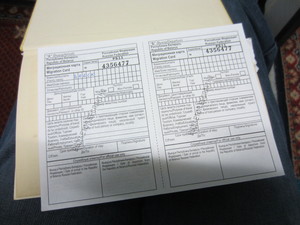
Russian migration card
The migration card is a double-form where you have to fill in some of your basic data. It's then stamped by the border guards and split in half. They keep one half, you get the other and keep it until you leave the country again. From what I've heard, one of the more troublesome things you can encounter is losing your migration card while in Russia.
There are some tricky things to know about the migration card. First: If you enter Russia through Belarus, you'll get only one migration card for both countries. That bothered me a lot on my last trip, because I only entered the data for Belarus, that means a stay of one day. Turned out this wasn't a big issue. When leaving Russia the border guards had a more closer look on the documents and obviously noticed the misinformation, but they didn't seem to care that much.
There seem to be similar issues with other countries. I even once got a migration card at the Ukrainian border, where I didn't want to enter Russia at all. It just happened that I was sitting in a train that was going to Russia after crossing the Ukraine. So if you ever happen to enter Russia through another country, although you don't necessarily get the migration card at the Russian border, you should enter the data for your stay in Russia.
Another thing I learned this time: There is a field for the Visa number. Now I obviously had two Visa - one for Belarus and one for Russia. I filed the number of the Russian one, because after all, I wanted to go to Russia and only cross Belarus on a train. Turned out I was wrong and the Belarus border guards complained. Admittedly, it can be a bit frightening if a border guard tells you something is wrong, especially if you don't understand their language. But after all, he just filled in the correct Visa number himself and everything was okay.
Kazakhstan also has a migration card, but it is not split in half and no similar pitfalls seem to occur there.
Sunday, July 17. 2011
Alternative routes through Kazakhstan
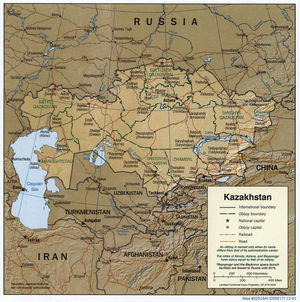 I have promised to write something about the route we had planned to take for the way back from China to Europe. We had several variants in mind, I'll list them all. All of them, however, have in common that they start in Ürümqi (乌鲁木齐, ئۈرۈمچی) - and as I already wrote, the train line to Ürümqi seems to be a bottleneck - it was booked out for an unknown amount of time.
I have promised to write something about the route we had planned to take for the way back from China to Europe. We had several variants in mind, I'll list them all. All of them, however, have in common that they start in Ürümqi (乌鲁木齐, ئۈرۈمچی) - and as I already wrote, the train line to Ürümqi seems to be a bottleneck - it was booked out for an unknown amount of time.Ürümqi is a town in the Uyghur province of China in the north-west. It is north of the Taklamakan desert. China's population is not evenly spread through the country. Most of the population lives in the eastern part. The west is sparsely populated and Ürümqi is one of the very few big cities in the west.
From Ürümqi, there are several options to go to Kazakhstan - there exist trains and busses both to Astana (Астана, أستانا), the current capital of Kazakhstan, and Almaty (Алматы, الماتى), the former capital.
Variant a: Twice through russia (our preferred option).
From Astana, there is a train directly to Kiev (Київ) in Ukraine. The train goes twice through russia. Once it scratches it before Oral / Uralsk (Орал). I think it doesn't even stop there. The other time it goes through the Caucasus region.
It should've been possible to buy the train ticket in Astana and then get a transit express visa in the russian consulate. I read some reports suggesting that EU people were able to do this. However, I was not entirely sure about that: Usually, a russian transit visa only allows to pass the country a single time. I don't know if crossing the country twice would've posed any problems.
Astana to Kiev is quite long - stopping was a problem, because you can only get the transit visa once you have the ticket for the whole journey. So our plan was to take the train just to Kharkiv (Харків) in the east of Ukraine. This would've limited the train trip to a bit more than two days. Still a lot, but acceptable for me.
Variant b: Once through russia.
Oral/Uralsk (Орал) in western Kazakhstan has its own russian embassy. As stated above, the train from Astana to Oral already crosses russia, but there's a way round: One can first take the train to Atyrau (Атырау) and then to Oral. This way, you don't leave Kazakhstan. The advantage: Lots of options to make stops, no overly long train trips.
The problem with this variant was that I had almost no information about the consulate in Oral: I haven't read a single report online that any EU citizen tried or successfully applied for a transit visa there. I only found some people asking that question, but without answers. So it was quite unsure if this would work.
Variant c: Avoiding russia altogether (option we originally intended to take).
It is also possible to avoid passing russia altogether. One can go by train to Atyrau (like in variant b), but then take a train on to Aktau (Ақтау) at the caspian see. From Aktau, there is a ferry service to Baku in Azerbaijan.
Now, this "ferry" has its own problems: It has no regular schedule. In fact, from what I read its no real ferry at all, but a cargo ship. It starts when there's enough cargo. So you have to get there and ask every day if there will be a ship today. Waiting times rank between some days and two weeks. I had liked to take that option, because I like travelling by ship and I thought that sounded like an interesting experience.
From Azerbaijan, one could take a train to Tbilis in Georgia and continue by bus to Istanbul in Turkey. From there, there is a train to Austria (the orient express sadly doesn't exist any more).
We had our visas ready for Kazakhstan and Azerbaijan. Georgia and Turkey are visa free for EU citizens.
If you look at a map, you may notice that there's another option: Going from Kazakhstan to Turkmenistan and Iran. However, that would've imposed getting two more visa plus the feeling that travelling through Iran might be a risk. So I haven't really investigated that option very much.
Posted by Hanno Böck
in English, Life
at
22:30
| Comments (0)
| Trackbacks (0)
Defined tags for this entry: asia, azerbaijan, caspian, china, ferry, kazakhstan, russia, travel, trip2011, visa
Friday, July 15. 2011
Visa
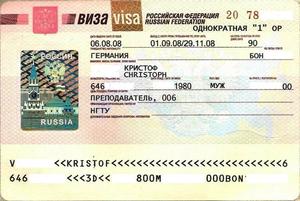 For our trip, we needed a couple of visa. I haven't applied myself for a visa any time before, so this was quite new to me. This was the most troublesome part of our travel preparations.
For our trip, we needed a couple of visa. I haven't applied myself for a visa any time before, so this was quite new to me. This was the most troublesome part of our travel preparations.What I learned about getting visa:
- Every country has different rules for visa.
- You cannot apply for several visa at once - they take your passport. That means you have to add all the waiting times and cannot apply for more than one at once (this may seem trivial if you know the procedure, but I didn't).
- The information on the consulates webpages is often incomplete or inaccurate. (For example, if you have a 30 day visa: Does that mean 30 days starting from your entry to the country? Or 30 days starting from a fixed date you have to know in advance? Pretty relevant if you plan your trip.)
- If you phone a consulate, they won't answer. If you email a consulate, they won't answer.
- You cannot expect that anyone in the consulate is able to speak to you in a language you understand.
- You cannot expect that information you got from people in the consulate is correct.
- Usually, the best way to get information is searching the internet for people who have done the same thing before. There are specialized companies that arrange your visa, but the information you get from them is also often inaccurate.
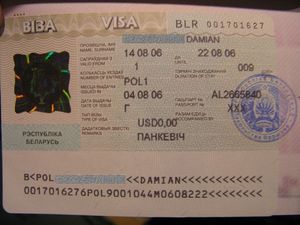 In the end, we applied for 6 different visa (Russia, Mongolia, Belarus, China, Kazakhstan, Azerbaijan), although we didn't use them all in the end (see previous blog entry).
In the end, we applied for 6 different visa (Russia, Mongolia, Belarus, China, Kazakhstan, Azerbaijan), although we didn't use them all in the end (see previous blog entry).The most difficult part was the russian one. That was, in the end, the reason we couldn't make the trip the way we wanted to (taking the transsiberian train for both directions with stops). They have a kind of bizzare regulation regarding invitations: You need an invitation to apply for a russian tourist visa. This has evolved a market for agencies that arrange invitations. That means you pay them that they do a fake booking in a hotel you will never see in reality and get an invitation from them.
Another anecdote: When asking for the "two-way"-problem in the embassy, they gave us a contact to a travel agency that will help us. This travel agency suggested we could get two passports and thus apply for two visa - that would've been illegal according to russian law. I had no intention in seeing a russian jail from inside, so I refused to choose that option.
You see, it's a pretty complex issue. But there's one thing one should mention, too: It's not the russian (or other countries) authorities that are to blame here. Russia is very willing to relax its visa rules. They even suggested several times to abbadon the visa requirement for EU citizens at all. They just have one requirement: The regulation should be relaxed for their citizens, too. Everything I've heared suggests that russians trying to get a visa for Germany and other EU countries face more difficulties than the other way round. It's the EU that is blocking here.
If you want visa regulations to be relaxed, you'd better not only blame other countries regulations. You should also ask how regulation is the other way round. Looking at the current political debate in the EU, I don't have much hope that the situation will improve soon.
(the pictures are from Wikimedia Commons here (Russia) and here (Belarus) and are public domain)
Posted by Hanno Böck
in English, Gentoo, Politics
at
22:56
| Comments (5)
| Trackbacks (0)
Defined tags for this entry: asia, azerbaijan, belarus, china, kazakhstan, mongolia, russia, travel, trip2011, visa
Tuesday, July 12. 2011
Travelling without flying - how I failed
I haven't stepped into an airplane for about 12 years. I travelled a lot through Europe with ferries, trains, busses and hitchhiking. It was my plan to stick to that on this big trip.
It's a simple fact that there is no viable option to use airplanes on a regular basis in a responsible way. There is no thinkable way that all humans on this planet can have access to planes. It only works because it's a privilege of a rich minority. And there's no thinkable way of combating climate change with the current growth rate of the aviation industry - not to mention the dangers of Peak Oil and unconventional oil extraction.
Some environmentalists who like flying found a very creative way to circumwent this: Compensating emissions. You pay an amount of money that's invested in some climate project for every flight you do. If I had to name the three most ridiculous actions people invented in combating climate change, compensating flight emissions would certainly rank amongst them (for the other two I'd vote carrot mobs and lights off actions). As above, this only works for a very small minority of rich people.
Ok, so back to our trip. It was my plan to avoid flying. I wanted to proove myself and others that it's possible. I failed. I took a plane from Beijing back to Germany. For a relatively trivial reason: Our plan was to take a train to Urumqi, then go to Kazakhstan and then we had two options, one with a train through russia to Ukraine and one through the caspian see to Azerbaijan (I will describe those in detail in a later blog entry). All of them requried getting to Urumqi first. There's no alternative route with public transport. And here's the problem: All tickets to Urumqi were sold out - for the whole time they can be booked in advance. So we wouldn't get tickets for an unknown amount of time.
I the end, after checking all alternative options I could think of, I decided to take a plane back to Germany and shorten my trip. I wasn't that unhappy about it after all, because I experienced our trip much more exhausting than imagined.
There would've been one other option: Taking the transsiberian train back. But that imposes another difficulty that has to do with russias visa regulation. A russian tourist visa is valid for 30 days. So ours is expired. It is not possible to get two visa at the same time, so it was not possible to arrange this in advance (it was our original plan to go back through Russia). And it is not possible to get a russian tourist visa anywhere else than in your home country. It used to be possible in Hong Kong in the past, but recently russia has tightened its visa regulations and according to several online sources this is no longer the case. The only option is getting a Russian transit visa. But that means you have to do the whole trip in a row and have all the tickets to Moscow and further to another country ready beforehand. This means several days in a train without much possibility to pause. I decided that I'm not up for that. I already found the many long train trips we did very difficult, partly because I'm slightly claustrophobic. My girlfriend will do the train trip - I won't. If you are ever in the same situation and need a travel agency, I can suggest Monkey Shrine - they are quite expensive, but their service was excellent. They were able to arrange all tickets including ones from Moscow to Kiev or Tallin and offered a lot of different options for all parts of the trip.
Now I don't think that my single flight will change much. It was a symbolic thing. But I think that opening options for flightless travelling is essential and gets far too less attention. If people talk about environmental or sustainable tourism, the issue of aviation is rarely spoken about. Often enough the problem is just that it is never considered. Take the visa regulation: If you enter and leave a country with an airplane, you usually don't need any visa - even if you change the plane within the country. There's no comparable rule for trains. You even need a visa if you enter and leave a country in a train without a stop. If you're looking for organized transsiberian railway trips, almost all the time it's taking the train for one direction and the plane for the other. Different public transport options often don't fit very well together. I always illustrate this with an experience I had last year when I switched from the train in Zeebrugge in Belgium to the ferry to Edinburgh - there was not any proper footpath from the train to the ferry, although they were only some dozent meters apart. You had to either illegally cross the railway lines or walk on a big street without a footway. I think many missing links for travel options could be closed if there would be more people doing it (e. g. there is no ferry from Singapoure or other Asian countries to Australia and none between Russia and Alaska, although the way isn't that far).
These are just some unfinished thoughts, but I could imagine there is a need for a lobby for flightless travelling. There's much more one could write about it. Flightless travelling means slower travelling - which brings up a discussion about our relation to working time.
If you're interested in flightless travelling, the best online ressource I found is the great webpage seat61.
My trip ends here, but some more blog entries will follow with stuff I didn't find the time yet to write down.
It's a simple fact that there is no viable option to use airplanes on a regular basis in a responsible way. There is no thinkable way that all humans on this planet can have access to planes. It only works because it's a privilege of a rich minority. And there's no thinkable way of combating climate change with the current growth rate of the aviation industry - not to mention the dangers of Peak Oil and unconventional oil extraction.
Some environmentalists who like flying found a very creative way to circumwent this: Compensating emissions. You pay an amount of money that's invested in some climate project for every flight you do. If I had to name the three most ridiculous actions people invented in combating climate change, compensating flight emissions would certainly rank amongst them (for the other two I'd vote carrot mobs and lights off actions). As above, this only works for a very small minority of rich people.
Ok, so back to our trip. It was my plan to avoid flying. I wanted to proove myself and others that it's possible. I failed. I took a plane from Beijing back to Germany. For a relatively trivial reason: Our plan was to take a train to Urumqi, then go to Kazakhstan and then we had two options, one with a train through russia to Ukraine and one through the caspian see to Azerbaijan (I will describe those in detail in a later blog entry). All of them requried getting to Urumqi first. There's no alternative route with public transport. And here's the problem: All tickets to Urumqi were sold out - for the whole time they can be booked in advance. So we wouldn't get tickets for an unknown amount of time.
I the end, after checking all alternative options I could think of, I decided to take a plane back to Germany and shorten my trip. I wasn't that unhappy about it after all, because I experienced our trip much more exhausting than imagined.
There would've been one other option: Taking the transsiberian train back. But that imposes another difficulty that has to do with russias visa regulation. A russian tourist visa is valid for 30 days. So ours is expired. It is not possible to get two visa at the same time, so it was not possible to arrange this in advance (it was our original plan to go back through Russia). And it is not possible to get a russian tourist visa anywhere else than in your home country. It used to be possible in Hong Kong in the past, but recently russia has tightened its visa regulations and according to several online sources this is no longer the case. The only option is getting a Russian transit visa. But that means you have to do the whole trip in a row and have all the tickets to Moscow and further to another country ready beforehand. This means several days in a train without much possibility to pause. I decided that I'm not up for that. I already found the many long train trips we did very difficult, partly because I'm slightly claustrophobic. My girlfriend will do the train trip - I won't. If you are ever in the same situation and need a travel agency, I can suggest Monkey Shrine - they are quite expensive, but their service was excellent. They were able to arrange all tickets including ones from Moscow to Kiev or Tallin and offered a lot of different options for all parts of the trip.
Now I don't think that my single flight will change much. It was a symbolic thing. But I think that opening options for flightless travelling is essential and gets far too less attention. If people talk about environmental or sustainable tourism, the issue of aviation is rarely spoken about. Often enough the problem is just that it is never considered. Take the visa regulation: If you enter and leave a country with an airplane, you usually don't need any visa - even if you change the plane within the country. There's no comparable rule for trains. You even need a visa if you enter and leave a country in a train without a stop. If you're looking for organized transsiberian railway trips, almost all the time it's taking the train for one direction and the plane for the other. Different public transport options often don't fit very well together. I always illustrate this with an experience I had last year when I switched from the train in Zeebrugge in Belgium to the ferry to Edinburgh - there was not any proper footpath from the train to the ferry, although they were only some dozent meters apart. You had to either illegally cross the railway lines or walk on a big street without a footway. I think many missing links for travel options could be closed if there would be more people doing it (e. g. there is no ferry from Singapoure or other Asian countries to Australia and none between Russia and Alaska, although the way isn't that far).
These are just some unfinished thoughts, but I could imagine there is a need for a lobby for flightless travelling. There's much more one could write about it. Flightless travelling means slower travelling - which brings up a discussion about our relation to working time.
If you're interested in flightless travelling, the best online ressource I found is the great webpage seat61.
My trip ends here, but some more blog entries will follow with stuff I didn't find the time yet to write down.
(Page 1 of 1, totaling 10 entries)